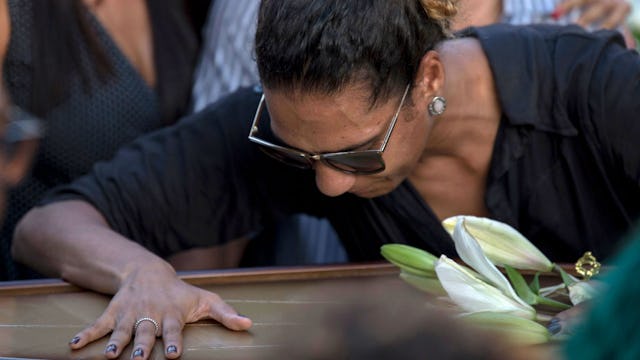When Tragedy Strikes, Parents Deserve Compassion, Not Judgment

I’ve had a severe phobia of spiders for as long as I can remember. I have a family member who, even as an adult, is terrified of the dark. And when I taught high school English, I had students absolutely paralyzed by the thought of speaking in front of the class. From fear of heights, to fear of death, we are all scared of something. But then we become parents. And our fears change.
Ask any parent, and most will tell you that their number one fear is something happening to their kids. It’s the terror that keeps us up at night and makes our hearts beat out of our chests when we watch them walk away. What would we do? How would we live with ourselves? Yet, despite knowing that this must be unimaginable pain, we are often unkind to the parents it does happen to. And we turn to judgment.
In 2016, a 2-year-old boy named Lane was splashing in the water at his Disney World resort when an alligator appeared and snatched him away from his parents, watching in horror nearby. Last April, a 5-year-old boy named Charlie became trapped between a booth and wall at a rotating restaurant in Atlanta and died. And just recently, a boy named Alby, who was about to turn four the next day, passed away after getting a bouncy ball lodged in his throat. He died in his mother’s arms as she tried to resuscitate him.
We hear of kids riding on tractors and falling off, or sledding into trees and breaking their necks. Kids die after getting stung by a bee or eating a nut because their parents didn’t know they were allergic.
So what are we supposed to do, as parents? Wrap them in a bubble and prevent them from ever leaving our side? Remove all toys from the home? And bees and nuts from the world? Never take them on vacations? Never show them the world?
What kind of life would that be for our children?
When Lane died, I was heartbroken. We’d been to Disney around that time as well, and I thought to myself, “Would I have let my kids dip their toes in that water?” I think I probably would. Would I have taken them to a cool rotating restaurant? Absolutely, even though my 5-year-old, like Charlie, may not sit still as he takes in the excitement of the world moving beneath his feet. And have we had bouncy balls in our house? We sure have.
My kids ride on the tractor with their grandfather. My son is allergic to nuts. We still go places and experience life, knowing the unimaginable can happen at any time. We take precautions—they wear seat belts, and helmets. We carry our epi-pen, and we hold their hands. We are probably a lot like the parents of Lane. And Charlie. And Alby.
Because the truth is, none of us immune to accident. None of us can say our kids are 100% safe. Sadly, that’s not how the world works. So why do we judge these parents after the most horrific days of their lives?
Why do we hurl hurtful words like “You should have known better than to let him play in that water” at Lane’s father, who jumped in and tried to wrestle that alligator to get his son back? Or “You should have watched your kid better!” at Charlie’s mother and father, or “Why did you have bouncy balls in your house? Don’t you know they are a choking hazard?!” to Alby’s mother?
Don’t you think they know these things? Don’t you think Lane’s parents and Alby’s parents and Charlie’s parents would give their own lives if they could just go back and “know better?” If they could go back and not visit that restaurant? Or at least keep him on their lap or next to them in the booth? Or not have bouncy balls in the house?
So what are we achieving when we judge grieving parents in this moment? Making ourselves feel better? Is this how we cope with our fears of “What if this happens to me?”—by redirecting those insecurities onto parents who need nothing more than compassion?
Because here’s the truth: We can’t say “That would never happen to me.” I mean, I guess we can. But we don’t know that. So maybe you live in Florida and know the danger of alligators and you’d never let your child play in that water. But maybe someday you’ll visit Nebraska, where Lane’s family lives, and a tornado rips through. Do you know what to do if there’s a tornado? I’ll bet his parents do. And I’ll bet that after losing their son, if you make a mistake, and tragedy strikes your family, they won’t say, “What’s wrong with you?! Don’t you know that you need to find low ground if a tornado hits?”
Like many parents around the U.S., I tied a blue ribbon to a tree in front of my house when that sweet boy was killed in Florida. Mostly for Lane, but also for his parents. They don’t know I tied a ribbon, and that’s okay. But that’s how I channeled my sadness, my fear of “What if this happens to my kids?” By mourning alongside them, rather than judging them.
Every time I blow out my birthday candles or blow an eyelash off of my finger or toss a penny into a fountain, I wish that my kids live a long and happy and healthy life. This is my wish, as I know it’s certainly not a guarantee.
And I’ll bet if you ask them, these grieving parents would say they made wishes just like mine.